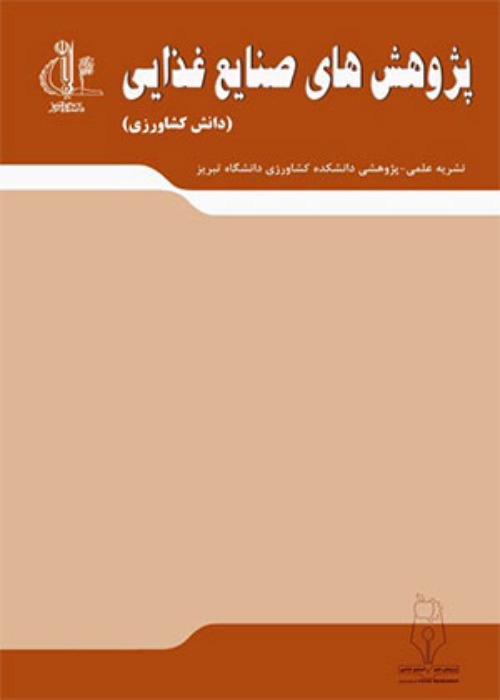Comparison of free and encapsulated extracts of Mentha pulegium's leaves in Allysum homolocarpum, chitosan and chitosan- Allysum homolocarpum on oxidative stability of soybean oil during 18 days incubation conditions
Oxidation of lipids occurs during storage and processing of food products due to the presence of a significant number of double bonds, which in addition to reducing their nutritional quality, leads to the production of free radicals and hydroperoxides. These free radicals cause spontaneous oxidation and the production of undesirable chemical compounds, resulting in bad taste in food. The most important vegetable oil produced in the world is soybean oil Which has high unsaturated compounds and are Its oxidation probability is high. Today, plant extracts rich in antioxidants are used as a source of nutrients that are effective in reducing oxidative stress (Farahmandfar 1391). Mentha pulegium is a medicinal plant of the Labiatae family (Lamiaceae) that has antioxidant activity and we used extract of this plant which extracted by ultrasound in this study (Kamkar et al. 2010). One of the most widely used methods in food formulation to deliver the active ingredient like this extract to the target product is the use of emulsion-based delivery systems and the most common of them are nanoemulsion systems. In water / oil / water emulsions, two general mechanisms for the release of bioactive compounds occur: 1) Release through the internal connection between the internal aqueous phase droplets and the surface cells formed by the rupture of the membrane between the internal aqueous phase and the surface cell, 2) Release of soluble materials trapped in the internal aqueous phase through diffusion from the internal aqueous phase into the external aqueous phase without membrane rupture due to density difference (Magdassi and Garti 1986). Therefore, when phenolic compounds are added to oils as natural antioxidants, controlling their release during storage, plays an important role in their antioxidant activity. The materials used for the encapsulation wall must be food grade, biodegradable and capable of forming a barrier between the internal phase and the environment. In this study, chitosan gum and Allysum homolocarpum seed were used as wall covering materials. There are several methods for micro-coating food, and freeze-drying is one of the most common methods which was also used in this study because it causes less damage to the material than other techniques performed at higher temperatures, and mainly aroma, flavor and other nutrients remain unchanged. The main purpose of this research is to extract the extract of Mentha pulegium by ultrasound method and nano-encapsulation of this extract with chitosan and Allysum homolocarpum gum coatings (independently and in combination with a ratio of 1: 1). when they are added to oils as natural antioxidants, controlling their release during storage, plays an important role in their antioxidant activity. Finally, we studied the effect of extract and encapsulated extract on oxidative stability in soybean oil
In the first part of this study, the leaf extract of Mentha pulegium was extracted by ethanol-water solvent (50:50) using an ultrasonic probe at 2 and 40 ° C for 10 and 20 minutes. The phenolic content of all extracts was measured by folin-ciocalteu method and their antioxidant activity was evaluated by DPPH free radical scavenging (50,100.300,400,500,600,700,800,1000 ppm) and oxidative stability tests using rancimat (500 ppm) and compared with TBHQ synthetic antioxidant (100 ppm). The initial water/oil emulsion (w/o) was prepared by mixing Mentha pulegium extract, emulsifier (Twin 80) and soybean oil in a ratio of 5: 33: 62%, respectively. Then, to prepare the final water /oil / water emulsion (w/o/w), the initial emulsion was mixed with hydrated gum in a ratio of 75:25% (w/w). After that, mean particle size, polydispersity index (PDI) and zeta potential values of nanoemulsions by Dynamic Light Scattering and also pH, brix, EE (%) were measured. These nanoemulsions were dried by freezing dryer. In the next part of this study, nanocoated extracts and free extracts of Mentha pulegium leaves each at concentrations of 500 and 1000 ppm and synthetic antioxidant TBHQ at a concentration of 100 ppm were added to soybean oil. The control sample was considered soybean oil without antioxidants. The antioxidant effect of treatments in soybean oil was investigated at 65 ° C during 18 days of incubation by measuring peroxide (PV), thiobarbituric acid (TBA) and Conjugated diene value (CDV). Also, the release rate of phenolic compounds in oil and the color index of oil samples during incubation were measured.
The extract was selected at a temperature of 50 ° C and a time of 10 minutes due to the higher content of phenolic compounds and antioxidant activity to continue the experiments of this study. The results of analysis of variance showed that the effect of phenol concentration of extracts on inhibition of free radicals was significant with increasing concentration. The highest radical inhibition at a concentration of 500 ppm was related to the treatment of 10-50 with a percentage of inhibition of 86.01%. Particle size of nanoemulsions coated by Allysum homolocarpum, chitosan and Allysum homolocarpum/chitosan combination are 82.22, 156.30 and 107.50 nm, respectively.At the end of the incubation period, the control sample showed the highest number of peroxide, thiobarbituric acid and conjugated diene value. The oxidative stability of soybean oil containing encapsulated extract was higher than soybean oil containing free in all concentrations. The sample of oil containing encapsulated extract coated with Allysum homolocarpum/chitosan combination showed higher oxidation stability than chitosan and Allysum homolocarpum coatings alone which was not significantly different from synthetic antioxidant TBHQ (p <0.05). Encapsulated extract with the Combination coating had the highest release of phenolic compounds over time. The results of analysis of variance showed the effect of wall type on the release rate of phenolic compounds of nanoparticles and were significant (p <0.05).
The oxidative stability of soybean oil containing encapsulated extract was higher than soybean oil containing free extract in all concentrations. The oil sample containing encapsulated extract coated with Allysum homolocarpum /chitosan combination coating had better oxidation stability than the others. At the end of the incubation period (18 days), the control sample showed the highest number of peroxides, thiobarbituric acid and conjugated diene, and nanocoating improved the antioxidant properties of Mentha pulegium leaf extract. Oxidative stability of soybean oil containing nano-coated extract was higher than soybean oil containing free Mentha pulegium extract in all concentrations. Increasing the concentration of Mentha pulegium extract more than 500 ppm caused the prooxidating properties of these compounds in soybean oil. Also, nanocoating of extract reduced the increasing trend of color index in soybean oil.
- حق عضویت دریافتی صرف حمایت از نشریات عضو و نگهداری، تکمیل و توسعه مگیران میشود.
- پرداخت حق اشتراک و دانلود مقالات اجازه بازنشر آن در سایر رسانههای چاپی و دیجیتال را به کاربر نمیدهد.



